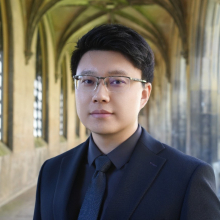CEE Seminar: Fantastic Uncertainties and How to Quantify Them - A Machine Learning Perspective

Marie Sklodowska-Curie Fellow, Division D (Civil), Department of Engineering, University of Cambridge
By-Fellow & Sustainability Advocate, Churchill College, University of Cambridge
Abstract: Unlike manufactured infrastructure materials such as concrete, asphalt or steel, geomaterials are naturally formed under complex geological forces. Consequently, their engineering properties exhibit greater uncertainty, which poses significant challenges for uncertainty quantification in geotechnical engineering. This presentation will begin with an overview of the multifaceted uncertainties present throughout the geotechnical analysis workflow, followed by a focused discussion on three sources of uncertainty: (i) uncertainties in soil properties, (ii) uncertainties in subsurface conditions, and (iii) the resulting uncertainties in geosystem behavior. I will share my work on techniques developed to quantify these uncertainties, with particular emphasis on how machine learning can offer improved solutions. First, the concepts of maximum entropy and fractional moments are introduced and applied to statistically characterize laboratory and field test results of soil properties in data-scarce scenarios. Second, two machine learning algorithms are developed to collectively characterize the three-dimensional spatial distribution of subsurface stratigraphy. These quantified uncertainties are incorporated into numerical models for system-level reliability assessment, but the high computational demands of such analyses often limit their practicality. To address this, deep learning architectures are developed as surrogates to enable efficient probabilistic predictions of both the stability factors and failure patterns of geosystems. Finally, an improved risk index that incorporates both aspects of information is developed to support risk-based geotechnical decision-making. In summary, this presentation demonstrates the diverse applications of machine learning as an effective computational tool for uncertainty quantification and risk and reliability assessment in geotechnical analysis workflow.
Bio: Wang is currently a Marie Skłodowska-Curie fellow at the University of Cambridge and a By-Fellow at Churchill College. Funded by the European Commission and UK Research and Innovation (UKRI), he currently serves as the principal investigator of a project on smart materials for sustainable road infrastructure. Prior to Cambridge, he earned both a bachelor’s degree and a doctorate in civil engineering from the National University of Singapore. Wang’s research explores how material heterogeneity and subsurface conditions influence the interactions among geosystems, humans and the environment. His work integrates machine learning, data-driven and statistical methods, numerical simulations and field monitoring technologies to conduct system-level simulations and model calibrations of geosystems. His research has led to 30 journal articles. In addition to contributing to research initiatives funded by the European Commission, UKRI and the National Research Foundation of Singapore, his research has led to software products currently employed by the Singapore government for ongoing infrastructure projects. Wang’s contributions have been recognized with a best paper award, and he was recently given the Bright Spark Lecture Award by the International Society of Soil Mechanics and Geotechnical Engineering.
Share
Upcoming Events
-
CEE Ph.D. Defense Announcement: Breaking New Ground - Excavation Performance in Tar-Infused and Conventional Soils for LA Metro D-Line Extension Project
-
MSE 298 Seminar: Tunable Optical Metasurfaces And Zero-Index Materials
-
EECS Seminar: Terahertz metasurface quantum-cascade vertical-external-cavity surface-emitting-lasers (VECSELs)
-
EECS Seminar: AI-Driven Design Automation for Multi-Chip Integration in AI Chips
-
CBE 298: Cell-Free Systems for Studying and Engineering Protein Assemblies
